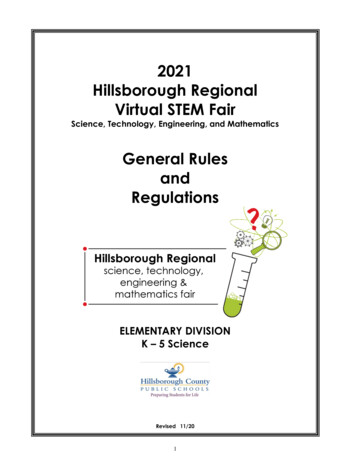
Transcription
2021Hillsborough RegionalVirtual STEM FairScience, Technology, Engineering, and MathematicsGeneral RulesandRegulationsELEMENTARY DIVISIONK – 5 ScienceRevised 11/201
GENERAL RULES AND REGULATIONSHILLSBOROUGH REGIONAL STEM FAIRELEMENTARY DIVISION K-5ENTRIESA. Every project entering the Regional STEM Fair must have previously been judged a winner at aschool fair and the project deemed Regional STEM Fair quality. If your school has a tie at a certaingrade level, please decide which project will represent your school.B. Individual participants must be students enrolled in grades 3-5 in public, charter, or private school inHillsborough County.C. Grade K-2 students enter as a class.D. Grade 3-5 students may enter as individuals, ORE. Grade 3-5 students may enter as a small group of 2-4 students.Students participating in small group projects must be from the same grade level.F. ESE classes may enter a non-judged project as a whole class or be included with your small groupproject entries if represented by a group of 2-4 students from the same grade level. If entered withyour small group projects – the project will be judged.Class ProjectsIndividual ProjectsSmall Group ProjectsESE Group: ClassNon-Judged EntriesAllowed Per SchoolJudged EntriesAllowed Per SchoolJudged EntriesAllowed Per SchoolNon-Judged EntriesAllowed Per SchoolK-2: 1 per gradeGrades 3-5: 2 per gradeGrades 3-5: 2 per grade1 per school*may include ESE smallgroup of 2-4 studentsG. It is the teachers' responsibility to inform and provide copies of these rules and regulations to theentrants. It is the students' responsibility to be knowledgeable of these rules and regulations.H. School registration form and registration fee of 50.00 per Hillsborough County Public Schools; 150.00 per Private schools and Charter schools by January 8, 2021.I.Checks should be made payable to Hillsborough County Schools/Hillsborough Regional STEM Fair,and sent to:Shana Tirado, Elementary SupervisorHillsborough County SchoolsROSSACRt. 7orShana Tirado, Elementary SupervisorHillsborough County Schools901 East Kennedy Blvd.Tampa, FL 33602-3408J. All project entries must be completed online by February 5, 2021.Project data must be entered using the URL line project data portal open: January 8, 2021 and February 5, 2021.K. Your site will keep all project forms on file. You will indicate forms have been completed during yourdata entry online.L. Winning class, individual and small group projects advancing to the Virtual STEM Fair willsubmit a Flipgrid. Deadline for Flipgrid entries is February 19, 2021.2
SPECIFIC GRADE LEVEL REQUIREMENTSA.Grades K-2:Students work collectively with the help of a directing teacher to produce a class projectas an engineer or inventor for display and be eligible for any special awards.B.Grades 3 - 5:Students work as individuals to complete a scientific experiment, engineer a solution orinvent a new product to solve a problem. Grades 3 - 5 students who work as a smallgroup must contribute equally to complete the project.C.A STEM Fair log is required for ALL projects, including Kindergarten, First andSecond grade class projects. The log should show evidence of student work throughoutthe experimentation period. This requires dates to be recorded as each part of the projectis done. A background paper is NOT required for any K-5 projects.D.Any projects that require a Human/Animal Research Form must submit the form to theteacher for approval.CATEGORIESA.Grades 3-5 individual projects are divided into 8 categories:Life ScienceBehavioral ScienceEarth/Space SciencePhysical Science – MatterPhysical Science – EnergyMath/ComputerEngineeringInventionGrades 3-5 small group projects are divided into 8 categories:Life ScienceBehavioral ScienceEarth/Space SciencePhysical Science – MatterPhysical Science – EnergyMath/ComputerEngineeringInventionB.The selection of category is the responsibility of the student with guidance from thesponsor.3
RESEARCH INVOLVING HUMANS/ANIMALSA.Students who intend to conduct research involving humans/animals must file a researchplan Human/Animal Research Form, p. 8 with the School's Review Committee*BEFORE starting research. Refer to the attached information concerning humaneconsiderations.B.No surgery or dissection may be performed.C.Non-mammalian vertebrates, excluding birds, may be used in biological experiments,provided that harm does not result from such experiments.RESEARCH INVOLVING HUMANSA. Normal physiological and behavioral studies for the human animal may be conducted,provided that such projects are carefully selected so that neither physiological norpsychological harm to the subject can result from such studies. No student should beallowed to proceed with any such research unless an adult supervisor determines that nophysical or psychological risk is involved.B. Students who intend to conduct research involving humans must file theHuman/Animal Research Form, with the School's Review Committee* BEFORE startingresearch. This form must accompany the application form submitted for the HillsboroughRegional STEM Fair and a copy must be kept in the student’s data log. Refer toinformation provided in this section.PROHIBITED RESEARCH:RESEARCH INVOLVING MOLD, GERMS, HUMAN BLOOD AND BACTERIAProjects involving HUMAN BLOOD and PATHOGENIC AGENTS (bacteria, mold-breadmold included, viruses, fungi, parasites, etc.) are prohibited. (Applies to allpathogens-human, non-human, and plants).*Yeast is the ONLY approved exception.RESEARCH INVOLVING WEAPONWeapons include any kind of gun, arrows, catapults, knives, darts, paint ball guns orexplosives (including rocketry engines). Any projects including these items are prohibitedat the elementary level. Any objects that could cause bodily harm are prohibited. Pleaseemail Shana Tirado on IDEAS if there are any questions on your student projects.*School's Review Committee is a group of qualified individuals responsible for evaluation ofstudent research for compliance with the rules. Members of the committee could include theschool assistant principal, principal, guidance counselor, psychologist, M.D., or Ph.D. in areasof science or science research, etc. Designate one member as a chairman.4
PROJECT RULES - RESEARCH INVOLVING VERTEBRATE ANIMALS(EXCLUDING HUMAN SUBJECTS)Humane ConsiderationsThe legitimate use of animals in the classroom, in the laboratory or in science research projectspresupposes two postulates. First, the use of animals for learning, as it is for testing and research ismorally acceptable; and second, that man has a responsibility to grant the animals used in researchevery humane consideration for their comfort and well being.The moral responsibility that we all have toward animals means that we cannot give free rein tostudents in research involving animals. Consequently, those of us who would nurture a healthycuriosity in youngsters are placed in a delicate position. To “turn off” a prospective biologist orphysician by excessive limitations would be a serious mistake. We know that through science fair workthousands of today's physician, dentists, veterinarians, scientists, engineers and science teachers weregiven an important impetus toward their careers.The proper care and use of animals is a primary consideration in school research projects. If thestudent can acquire this concern, through becoming familiar with animals and their needs, it will bebeneficial to both the scientific and personal development and education of the student.The use of protista and other invertebrates is to be encouraged for most research involving animals.Their wide variety and the feasibility of using larger numbers than is usually possible with vertebratesmake them especially suitable.This is not to say that the use of vertebrate animals should be prohibited. Certain forms of investigationcan only be done with vertebrates. But since the higher forms of animal life are more complex, moreexperience and training are required to use them properly. Under proper supervision, there is noreason why students should not be permitted to use vertebrates in research.All animals should be lawfully acquired, and their care and use must be in compliance with local, stateand federal laws. Lack of availability of information about the proper care and use of animals is not anacceptable excuse. There are numerous publications, sources of information and professionalsavailable who can supply information on proper care no matter how remote the school district.Proper care is imperative since quality animal research demands quality animal care. If animals are notused or cared for properly, the accuracy of the data is certainly questionable, and thus the value of theproject greatly decreased or even destroyed. Non-behavioral studies involving common laboratoryanimals (rats, mice, hamsters, gerbils, guinea pigs and rabbits) are permitted only in an institutionalenvironment and cannot be conducted in the home. A student must have an adequate knowledge ofthe characteristics, care and handling of the species to be used in order to do good research.The use of animals by students under qualified adult supervision is both necessary and important forlearning about the life science and for encouraging an interest in careers in the life sciences. To bedone properly, however; it must include a concern for the humane and proper use of animals,particularly vertebrates. To ensure this, qualified adult supervision is essential.5
PROJECT RULES - RESEARCH INVOLVING VERTEBRATE ANIMALS(EXCLUDING HUMAN SUBJECTS)(Continued)All research involving live vertebrate animals must conform to the following rules:1. Research must be conducted with a respect for life and an appreciation of humane considerationsthat must be afforded all animals. Development of new, or refinements of existing, surgicaltechniques, or research which is carried to a lethal conclusion without proper sacrifice, are neitherhumane nor do they develop a respect for life, nor are they educational, and thus are not allowed.2. Surgical procedures on vertebrate animals will only be done within academic, hospital, clinical orinstitutional research facilities under direct adult supervision to assure proper technique. This rule isintended specifically to prohibit such procedures at home.3. The comfort of the animals used in any research experiment shall be a prime concern. No researchusing live vertebrate animals shall be attempted unless the animals have been obtained from areliable source and the following conditions can be assured: appropriate, comfortable quarters;adequate food and water; humane treatment and gentle handling. Proper quarters and care mustbe provided at all times, including weekends, holidays and vacation periods, to be in compliancewith federal and state guidelines. Animals must be observed daily to assess their health andwelfare.4. Under no circumstances should the student be allowed to perform sacrifice unless under theimmediate supervision and in the presence of the animal care supervisor, qualified scientist and/orthe designated adult supervisor (except in an emergency which would require a humane terminationof life).5. Observations of wild or domestic animals in their normal habitat where no contact with individualanimals is involved require only a Human/Animal Research Form.6. Weight loss in animals is one significant sign of stress or toxicity and maximum permissible weightloss or growth retardation of any experimental or control animal is 15 percent.7. Acid rain, insecticide and herbicide toxicity studies using live vertebrate animals are prohibited.Tissue and invertebrate studies are recommended as alternative models for testing.To provide for humane treatment of animals, an animal care supervisor who is knowledgeable in theproper care and handling of laboratory animals must assume primary responsibility for the conditionsunder which the animals are maintained.No research may be undertaken with vertebrate animals that involves anesthetics, drugs, thermalprocedures, physical stress, organisms pathogenic to man or other vertebrates, ionizing radiation,carcinogens or surgical procedures, unless these procedures are performed UNDER THE DIRECTSUPERVISION OF AN EXPERIENCED AND QUALIFIED SCIENTIST OR DESIGNATED ADULTSUPERVISOR IN AN INSTITUTION LABORATORY. In addition to the Qualified Scientist, aDesignated Adult Supervisor will be required when the research is not conducted in the QualifiedScientist's laboratory.These Rules and Procedures have been excerpted from the International Science and Engineering FairRules.*If required by School Review Committee due to possible risk to animals or humans.6
HUMAN/ANIMAL RESEARCH FORM*Required For All Projects Using Animals or HumansMUST BE COMPLETED PRIOR TO DOING ANY ANIMAL OR HUMAN RESEARCHType or PrintStudent Individual / Group Name(s):Grade:School:Category:Teacher’s Name:A.Title of Project:B.Starting Date of Experiment:C.Explanation and Purpose of Experiment:D. Describe how the animal(s) / humans will be used in this experiment. Include provisions for animalcare and safety. For Human Research, include procedures to minimize any risks:Signature of Student:I certify that I have reviewed the research plan prior to the beginning of the experiment and it doescomply with the Animal or Human Research Rules of the Hillsborough Regional Science Fair.Date: Signature:Chairperson – School Review Committee*Signature of Adult Supervisor (Human Research)*Signature of Animal Care Supervisor:*If required by School Review Committee due to possible risk to animals or humans.7
FLIPGRID PRESENTATIONSA.Students may have assistance with their presentation however, the project andinformation shared must be done by the students.B.Flipgrid presentations should be no longer than 5 minutes long.C.Names/School logos may not appear during the presentation.D.Students may display prototypes, demonstrate experiments, and solutions, inaccordance to all rules.E.It is the school’s responsibility to ensure media releases are on file.F.Small groups may include all members in the Flipgrid presentation.PRESENTATION RESTRICTIONSA. Chemicals and any liquids (including household products), foods, gases, open flames, andexplosives may not be used.B. Pictures of dead or dissected animals may not be used.C. Controlled or illegal substances, including over the counter drugs, prescription drugs,alcohol, or tobacco may not be part of the entire display.D. Knives, syringes, or any sharp objects are not to be displayed.E. The exhibition of human/animal parts is prohibited.8
Hillsborough County Public SchoolsMEMORANDUMDATE: November 2020TO:Elementary AdministratorsFROM:Shana Tirado, K-5 Science SupervisorSUBJECT:Hillsborough Regional Virtual STEM Fair Registration FormIf your school is choosing to participate in the 2021 Hillsborough Regional STEM Fair, please completethe information below to indicate your intent and the name of the STEM Fair contact person for yourschool. This information will facilitate the online procedure.Elementary Division registration fee: 50.00 for Hillsborough County Public Schools 150.00 Private Schools and Charter SchoolsPlease make checks payable to Hillsborough County Regional STEM Fair.Return this form to:Shana Tirado, K-5 Science Department901 E. Kennedy Blvd.Tampa, FL 33602-3408Due date: January 8, 2021If you have any questions, please contact my office at 272-4485.2021 HILLSBOROUGH COUNTY REGIONAL STEM FAIRK-5 DIVISION REGISTRATION FORMWe:ARE participating in the Hillsborough Regional STEM Fair.ARE NOT submitting entries for the Hillsborough Regional STEM Fair,and hosting a school wide Science STEM Fair onSCHOOL:ADDRESS:PHONE #Please Print:STEM FAIR CONTACT PERSON(s):Email Address(s):9
H. School registration form and registration fee of 50.00 per Hillsborough County Public Schools; 150.00 per Private schools and Charter schools by January 8, 2021. I. Checks should be made payable to Hillsborough County Schools/Hillsborough Regional STEM Fair, and sent to:

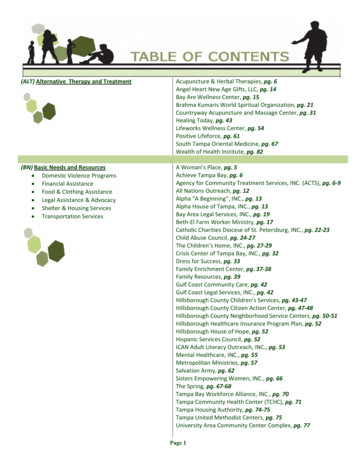
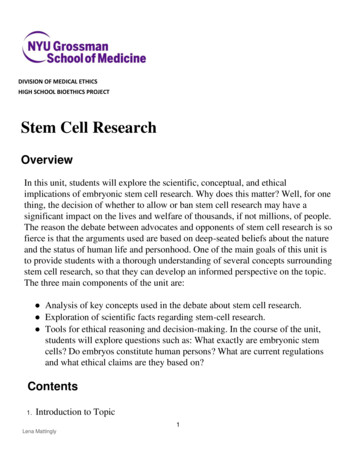

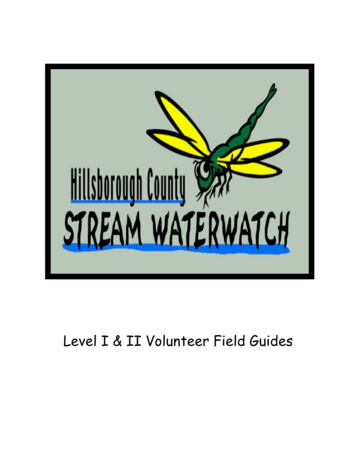
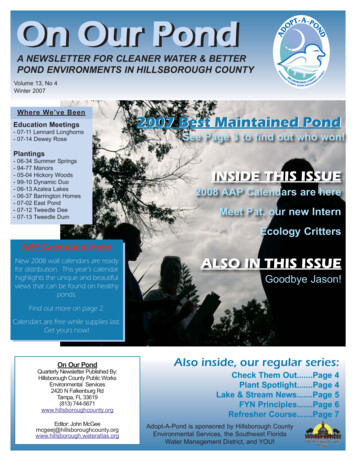
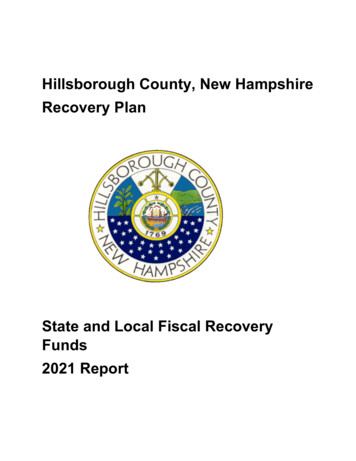
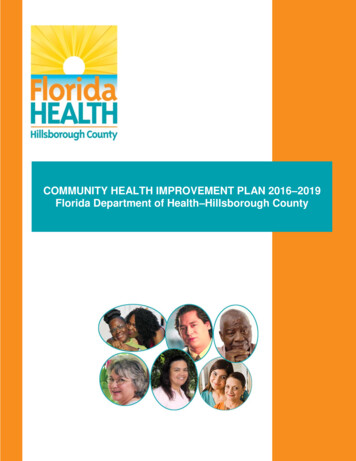
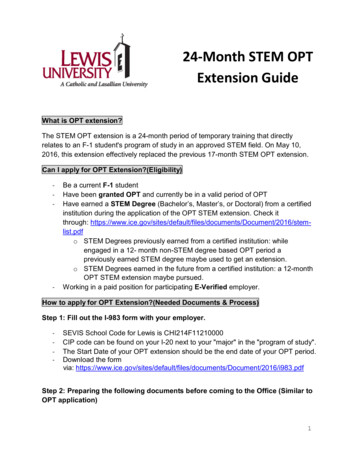

![2020-21 Florida's Optional Innovative Reopening Plan [Hillsborough County]](/img/27/hillsborough-reopenplan.jpg)